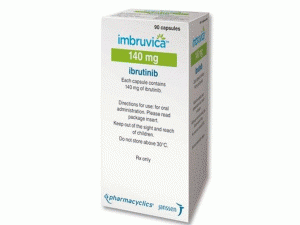依鲁替尼胶囊(Imbruvica Capsules 140mg)
 产地国家:日本
处方药:是
所属类别: 140毫克/粒 14粒/盒
包装规格: 140毫克/粒 14粒/盒
计价单位:盒
生产厂家英文名:Janssen Pharmaceutical Co
原产地英文商品名:Imbruvica Capsules(イムブルビカカプセル)140mg/cap 14caps/box
原产地英文药品名:ibrutinib
中文参考商品译名:IMBRUVICA胶囊(イムブルビカカプセル)140毫克/粒 14粒/盒
中文参考药品译名:拉铁尼伯
曾用名:依鲁替尼
产地国家:日本
处方药:是
所属类别: 140毫克/粒 14粒/盒
包装规格: 140毫克/粒 14粒/盒
计价单位:盒
生产厂家英文名:Janssen Pharmaceutical Co
原产地英文商品名:Imbruvica Capsules(イムブルビカカプセル)140mg/cap 14caps/box
原产地英文药品名:ibrutinib
中文参考商品译名:IMBRUVICA胶囊(イムブルビカカプセル)140毫克/粒 14粒/盒
中文参考药品译名:拉铁尼伯
曾用名:依鲁替尼
简介:
部份中文依鲁替尼处方资料(仅供参考) 商品名:IMBRUVICA Capsules 英文名:Ibrutinib 中文名:依鲁替尼胶囊(拉铁尼伯) 生产商:杨森制药イムブルビカカプセル140mg 药用类别名称:抗恶性肿瘤药物(布列塔尼型酪氨酸激酶抑制剂) 批准日期:2016年5月 商标名:IMBRUVICA Capsules 一般名:イブルチニブ(JAN)、Ibrutinib (JAN) 化学名:1-{(3R)-3-[4-Amino-3-(4-phenoxyphenyl)-1H-pyrazolo[3,4-d]pyrimidin-1-yl]piperidin-1-yl}prop-2-en-1-one 分子式:C25H24N6O2 分子量:440.50 性状:白色固体溶解度易溶于二甲基亚硫酸, 微溶于甲醇, 微溶于乙腈, 不易溶于水。熔点149至158°c分佈係数3.97 (log p, 1-octanol/ph7缓衝区)操作注意事项请放在儿童接触不到的地方。批准条件制定药品风险管理计划并加以实施。复发性或难治性慢性淋巴细胞白血病(包括小淋巴细胞淋巴瘤) >由于日本的临床试验病例极为有限, 在製造和销售之后, 直到积累了一定数量的病例资料, 通过对所有病例进行使用等级调查, 掌握使用这种药物的患者的背景资讯, 在早期阶段收集有关该製剂安全性和有效性的资料, 并採取必要措施正确使用该製剂。复发性或难治性地幔细胞淋巴瘤>由于日本的临床试验病例极为有限, 在製造和销售之后, 直到积累了一定数量的病例资料, 通过对所有病例进行使用等级调查, 掌握使用这种药物的患者的背景资讯, 在早期阶段收集有关该製剂安全性和有效性的资料, 并採取必要措施正确使用该製剂。 药用药理学:1. 作用机制布列塔尼酪氨酸激酶(btk)是一种信号分子, 位于b细胞肿瘤发病的下游, b细胞受体参与增殖等, b细胞迁移, c细胞参与粘附等。伊伯裡尼在btk活性位点 (cysteine) 中与半胱氨酸残基共价结合, 抑制btk的激酶活性。2. 抗肿瘤作用在体外试验中, 伊布利尼从cll细胞和人类地幔细胞淋巴瘤(mcl)衍生细胞系(米诺、jeko-1等) 中抑制了慢性淋巴细胞白血病(cll)患者的生长。此外, 它还能抑制cll患者(mino和jeko-1) 的cll细胞和人的mcl衍生细胞系的迁移和粘附。在体内试验中, 抑制了tcl1-192细胞在外周血中tcl1-192细胞的增殖。此外, 在scid小鼠体内植入米诺细胞系, 以减少米诺细胞的数量 适应症:1. 慢性淋巴细胞白血病 (包括小淋巴细胞淋巴瘤)2. 复发性或难治性地幔细胞淋巴瘤用 法与用量:1. 慢性淋巴细胞白血病 (包括小淋巴细胞淋巴瘤)成人每天口服一次420mg 作为伊布利布。另外, 根据患者的病情酌情减肥。2. 复发性或难治性地幔细胞淋巴瘤成人每天口服一次560毫克作为伊布利布。另外, 根据患者的病情酌情减肥。 包装:胶囊140m,14胶囊(14胶囊x1)英文版说明书:
IMBRUVICA®(ibrutinib)IMPORTANT SAFETY INFORMATIONWARNINGS AND PRECAUTIONSHemorrhage-Fatal bleeding events have occurred in patients treated with IMBRUVICA®. Grade 3 or higher bleeding events (intracranial hemorrhage [including subdural hematoma], gastrointestinal bleeding, hematuria, and post-procedural hemorrhage) have occurred in up to 6% of patients. Bleeding events of any grade, including bruising and petechiae, occurred in approximately half of patients treated with IMBRUVICA®.The mechanism for the bleeding events is not well understood. IMBRUVICA® may increase the risk of hemorrhage in patients receiving antiplatelet or anticoagulant therapies and patients should be monitored for signs of bleeding. Consider the benefit-risk of withholding IMBRUVICA® for at least 3 to 7 days pre- and postsurgery depending upon the type of surgery and the risk of bleeding.Infections-Fatal and non-fatal infections have occurred with IMBRUVICA® therapy. Grade 3 or greater infections occurred in 14% to 26% of patients. Cases of progressive multifocal leukoencephalopathy (PML) have occurred in patients treated with IMBRUVICA®. eva luate patients for fever and infections and treat appropriately.Cytopenias-Treatment-emergent Grade 3 or 4 cytopenias including neutropenia (range, 19% to 29%), thrombocytopenia (range, 5% to 17%), and anemia (range, 0% to 9%) occurred in patients treated with IMBRUVICA®. Monitor complete blood counts monthly.Atrial Fibrillation - Atrial fibrillation and atrial flutter (range, 6% to 9%) have occurred in patients treated with IMBRUVICA®, particularly in patients with cardiac risk factors, hypertension, acute infections, and a previous history of atrial fibrillation. Periodically monitor patients clinically for atrial fibrillation. Patients who develop arrhythmic symptoms (eg, palpitations, lightheadedness) or new-onset dyspnea should have an ECG performed. Atrial fibrillation should be managed appropriately and if it persists, consider the risks and benefits of IMBRUVICA® treatment and dose modification.Hypertension - Hypertension (range, 6% to 17%) has occurred in patients treated with IMBRUVICA® with a median time to onset of 4.5 months (range, 0.03 to 18.40 months). Monitor patients for new-onset hypertension or hypertension that is not adequately controlled after starting IMBRUVICA®. Adjust existing antihypertensive medications and/or initiate antihypertensive treatment as appropriate.Second Primary Malignancies - Other malignancies (range, 5% to 16%) including non-skin carcinomas (range, 1% to 4%) have occurred in patients treated with IMBRUVICA®. The most frequent second primary malignancy was non-melanoma skin cancer (range, 4% to 13%).Tumor Lysis Syndrome - Tumor lysis syndrome has been infrequently reported with IMBRUVICA® therapy. Assess the baseline risk (eg, high tumor burden) and take appropriate precautions. Monitor patients closely and treat as appropriate.Embryo-Fetal Toxicity - Based on findings in animals, IMBRUVICA® can cause fetal harm when administered to a pregnant woman. Advise women to avoid becoming pregnant while taking IMBRUVICA® and for 1 month after cessation of therapy. If this drug is used during pregnancy or if the patient becomes pregnant while taking this drug, the patient should be apprised of the potential hazard to a fetus.ADVERSE REACTIONSThe most common adverse reactions (≥20%) in patients with B-cell malignancies (MCL, CLL, WM) were thrombocytopenia* (57%, 53%, 43%), diarrhea (51%, 48%, 37%), anemia* (41%, 37%, 13%), neutropenia* (47%, 46%, 44%), musculoskeletal pain (37%, 32%†, NA‡), fatigue (41%, 29%, 21%), bruising (30%, 25%†, 16%†), nausea (31%, 24%, 21%), rash (25%, 23%†, 22%†), and upper respiratory tract infection (34%, 19%, 19%).*Based on adverse reactions and/or laboratory measurements (noted as platelets, neutrophils, or hemoglobin decreased).Includes multiple ADR terms.Not applicable; no associated ADRs.The most common Grade 3 or 4 non-hematologic adverse reactions (≥5%) in MCL patients were pneumonia (7%), abdominal pain (5%), atrial fibrillation (5%), diarrhea (5%), fatigue (5%), and skin infections (5%).Approximately 4% (CLL), 14% (MCL), and 11% (WM) of patients had a dose reduction due to adverse reactions.Approximately 4%-10% (CLL), 9% (MCL), and 6% (WM) of patients discontinued due to adverse reactions. Most frequent adverse reactions leading to discontinuation were pneumonia, subdural hematomas, and atrial fibrillation (1% each) in CLL patients and subdural hematoma (1.8%) in MCL patients.DRUG INTERACTIONSCYP3A Inhibitors - Avoid coadministration with strong and moderate CYP3A inhibitors. If a moderate CYP3A inhibitor must be used, reduce the IMBRUVICA® dose.CYP3A Inducers - Avoid coadministration with strong CYP3A inducers.SPECIFIC POPULATIONSHepatic Impairment - Avoid use in patients with moderate or severe baseline hepatic impairment. In patients with mild impairment, reduce IMBRUVICA® dose.用药温馨提示:当您服用此药物时,需定期接受医疗专业人士的检查,以便随时针对其药效、副作用等情况进行监测。本网站所包含的信息旨在为患者提供帮助,不能代替医学建议和治疗。
药品价格查询,专业药品查询网站,药品说明书查询,药品比价 » 依鲁替尼胶囊(Imbruvica Capsules 140mg)
药品价格查询,专业药品查询网站,药品说明书查询,药品比价 » 依鲁替尼胶囊(Imbruvica Capsules 140mg)


